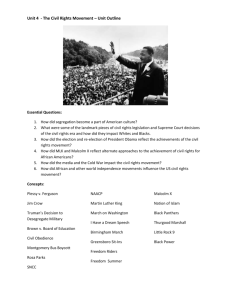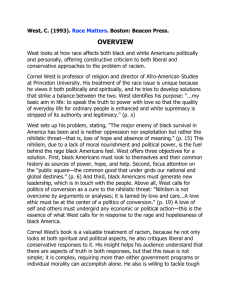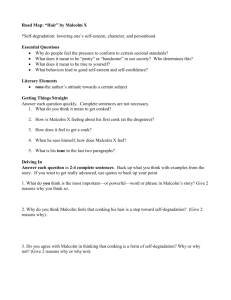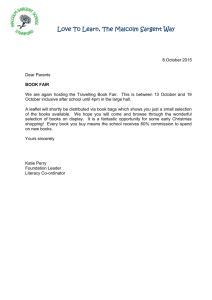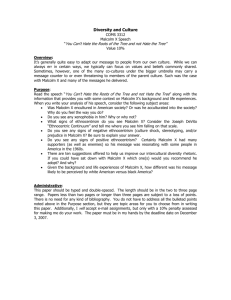SOC - Book Report
advertisement
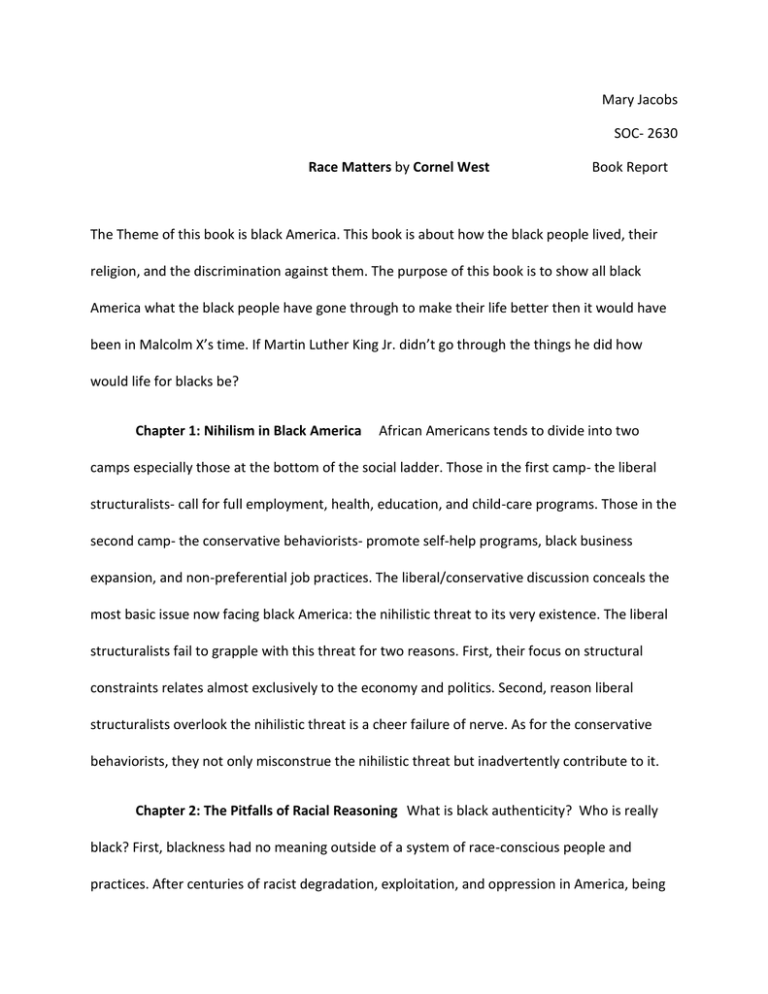
Mary Jacobs SOC- 2630 Race Matters by Cornel West Book Report The Theme of this book is black America. This book is about how the black people lived, their religion, and the discrimination against them. The purpose of this book is to show all black America what the black people have gone through to make their life better then it would have been in Malcolm X’s time. If Martin Luther King Jr. didn’t go through the things he did how would life for blacks be? Chapter 1: Nihilism in Black America African Americans tends to divide into two camps especially those at the bottom of the social ladder. Those in the first camp- the liberal structuralists- call for full employment, health, education, and child-care programs. Those in the second camp- the conservative behaviorists- promote self-help programs, black business expansion, and non-preferential job practices. The liberal/conservative discussion conceals the most basic issue now facing black America: the nihilistic threat to its very existence. The liberal structuralists fail to grapple with this threat for two reasons. First, their focus on structural constraints relates almost exclusively to the economy and politics. Second, reason liberal structuralists overlook the nihilistic threat is a cheer failure of nerve. As for the conservative behaviorists, they not only misconstrue the nihilistic threat but inadvertently contribute to it. Chapter 2: The Pitfalls of Racial Reasoning What is black authenticity? Who is really black? First, blackness had no meaning outside of a system of race-conscious people and practices. After centuries of racist degradation, exploitation, and oppression in America, being black means being minimally subject to white supremacist abuse and being part of a rich culture and community that has struggled against such abuse. All people with black skin and African phenotype are subject to potential white supremacist abuse. All black Americans have some interest in resisting racism- even if their interest is confined solely to themselves as individuals rather then to larger black communities. Any claim to black authenticity- beyond that of being a potential object of racist abuse and an heir to a grand tradition of black struggle is contingent on one’s political definition of black interest and one’s ethical understanding of how this interest relates to individuals and communities in and outside black America. Chapter 3: The Crisis of Black Leadership There has not been a time in the history of black people in this country when the quality of both groups has been so low. Just when one would have guessed that black America was flexing its political and intellectual muscles, rigor mortis seems to have set in. how do we account for the absence of the Frederick Douglasses, Sojourner Truths, Martin Luther King Jrs. Malcolm Xs, and Fannie Lou Hamers in our time? Why hasn’t black America produced intellectuals of the caliber of W. E. B. Du Bios, Anna Cooper, E. Franklin Frazier, Oliver Cox, and Ralf Ellison in the past few decades? Black college professors in the years of Jim Crow laws; and prominent athletes, entertainers, and white collar personnel after World War 2 all serve as examples of black middle- class status prior to the passing of the Civil Rights Bill in 1964 and the Voting Rights Bill of 1965. The crisis in black leadership can be remedied only if we candidly confront its existence. Chapter 4: Demystifying the New Black Conservatism A visible and aggressive black intellectual conservative assault on traditional black liberal ideas. The promotion of conservative perspectives is not new in African-American history. Loury puts forward three basic charges against black liberal thinkers. First, he holds that black liberals adhere to a victim-status conception of black people that results in blaming all personal failings of black people on white racism. Second, he claims that black liberals harbor a debilitating loyalty to the race that blinds them to the pathological and dysfunctional aspects of black behavior. Third, Loury argues that black liberals truncate intellectual discourse regarding the plight of poor black people by censoring critical perspectives which air the “dirty linen” of the black community. The new black conservatives assume that without affirmative action programs, white Americans will make choices on merit action programs, white Americans will make choices on merit rather then on race. Chapter 5: Beyond Affirmative Action: Equality and Identity The fundamental crisis in black America is twofold: too much poverty and too little self-love. The urgent problem of black poverty is primarily due to the distribution of wealth, power, and income- a distribution influenced by the racial case system that denied opportunities to most “qualified” black people until two decades ago. Given the history of this country, it is a virtual certainty that without affirmative action racial and sexual discrimination would return with a vengeance. Even if affirmative action fails significantly to reduce black poverty. Affirmative action is not the most important issue for black progress in America, but it is part of a redistributive chain that must be strengthened if we are to confront and eliminate black poverty. Chapter 6: On Black-Jewish Relations Black anti-Semitism rest on three basic pillars. First, it is a species of anti whitism. Jewish complicity in American racism even though it is less extensive than the complicity of other white American- reinforces black perceptions that Jews are identical to any other group benefitting from white-skin privileges in racist America. This view denies the actual history and treatment of Jews. Black anti-Semitism is a result of higher expectations some black folk have of Jews. This perspective holds Jews to a moral standard different form that extended to other white ethnic group. Black anti-Semitism is a form of underdog resentment and envy, directed at another underdog who has “made it” in American society. Chapter 7: Black Sexuality: The Taboo Subject Americans are obsessed with sex and fearful of black sexuality. The obsession has to do with a search for stimulation and meaning in a fast-faced, market-driven culture; the fear is rooted in visceral feeling about black bodies fueled by sexual myths of black women and men. The dominant myths draws black women and men either as threatening creatures who have the potential for sexual power over whites, of as harmless, desexed underlings of a white culture. Everyone knows it is virtually impossible to talk candidly about race without talking about sex. Black sexuality is a taboo subject in America principally because it is a form of black power over which whites have little control. Chapter 8: Malcolm X and Black Rage Malcolm X profound commitment to affirm black humanity at any cost and his tremendous courage to accent the hypocrisy of American society made Malcolm X the prophet of black rage then and now. Malcolm X was the prophet of black rage primarily because of his great love for black people. Malcolm X’s articulation of black rage was not directed first and foremost at white America. Rather, Malcolm believed that if black people felt the love that motivated that rage the love would provide a psychic conversion in black people; they would affirm themselves as human beings, no longer viewing their bodies, minds, and souls through white lenses, and believing themselves capable of taking control of their own destinies. Malcolm K’s notion of psychic conversions holds that black people must no longer view themselves through white lenses. Malcolm X’s notion of psychic conversion depends on the idea that black spaces, in which black community, humanity, love, care, concern , and support flourish , will emerge from a boiling black rage. In each of Cornel West’s chapters he analyses different issues about race and having a solution each time. The three main things he talks about is the nihilistic threat, Malcolm X and Black rage, and black leader ship. This book makes a big contribution to sociology because it teaches us the difference of what happened to blacks and what happened to whites and how each of them were taught. It widened my knowledge of the backgrounds of each race because I didn’t realize we were raised so different. It also helped me appreciate that I didn’t have to go though that, compared to what some people had to go through. This book was interesting, but it was also hard to read. Part of the time I was reading this book I was kind of confused by what it was talking about. I went back and reread a couple of sentences other then that in was interesting to read.
